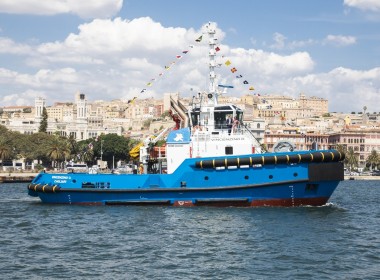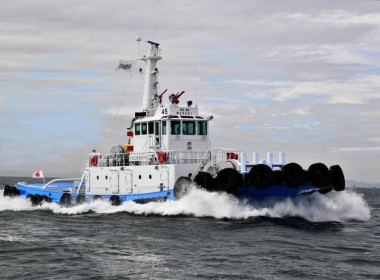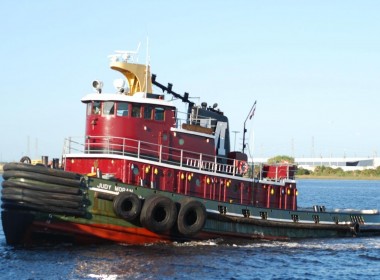COLUMN | Tugs appear to be Keeping Calm and Carrying On [Tug Times]

What a confusing place the world has become. Some leaders deny the dangers of the coronavirus and still think it will magically disappear, while many ordinary people seem to be taking leave of any senses they may once have possessed.
Take the port authorities in Auckland, who launched a competition to name their new electric tug. Having wisely said that Tuggy McTugface was not an option, they then offered ET and Sparky as alternatives.
It gets worse. Some zealots are demanding that England rugby supporters stop singing Swing Low, Sweet Chariot because it is a spiritual written by a member of the Choctaw tribe. Alright, that may not be the exact reason, but it is true and probably just as valid as whatever the zealots are complaining about.
Women are jumping on the bandwagon and demanding “inclusion” as well, and the academics are encouraging them – a recent study has revealed that men’s training shoes are more colourful and more expensive than women’s, so I expect them to start attacking shoe shops at any moment.
The one thing that might save the cobbling community is that only five per cent of senior management positions are held by women, so they may have trouble finding somebody to lead them.
Meanwhile, Lloyds of London has apologised because a couple of hundred years ago the company insured slaving ships. They probably insured whalers as well, but the environmentalists have been rather slower on the uptake. The fact that it is highly likely nobody at Lloyds owns any slaves today, and equally likely that none of their customers was ever a slave cuts no ice. Their leaders have been forced to apologise and offer reparations for something that happened hundreds of years ago.
Elsewhere, ignorant hooligans are busy tearing down statues of anyone who did not have 21st century sensibilities, which helps to ensure people will no longer be able to learn from the mistakes of the past.
One of the most moving, frightening and horrifying places I have ever been is Dachau concentration camp. My son and I were looking at an enlarged photograph of children who were rescued when the camp was liberated. It was a heart-rending image, but as we studied it a man with a camera approached and asked me to take a photograph of him beside the picture.
He had a yellow Star of David pinned to his overcoat, so after I took some shots I pointed to him, then to the photograph on the wall. He nodded to indicate he was one of those children. To my great regret, I was dumbstruck and did not speak to the man, although to this day I am not sure what I could have said. “Sorry” could never be enough.
My point, of course, is that keeping Dachau and the other horrific reminders of the Holocaust is better than bulldozing them flat simply because the Nazis were not very nice to minorities. They are necessary reminders of a perverted ideology and its evils, and a powerful learning tool for future generations. I tend to think statues of Confederate generals can serve the same purpose.
“He continued the lesser sin of slaving for another six years”
Hymns are another possible target. Because most of the zealots appear to be rather uneducated, I am going to tell them about John Newton (1725 – 1807) who commanded slaving ships and was said to be the most foul-mouthed man most people had ever met. Then in a severe storm off the coast of Ireland in 1748 he thought he was going to die and pleaded with God to spare him. If God did the business, he promised to mend his ways.
God duly obliged, and Newton stopped drinking and swearing, although he continued the lesser sin of slaving for another six years. Then in 1754 he hung up his sextant and leg irons and studied to become a clergyman, and was ordained in 1764. Today we remember him, if we remember him at all, for a poem he wrote in 1772, which was later set to music.
Amazing Grace became one of the most-performed and most-recorded songs the world has ever known. Mahalia Jackson and Aretha Franklin both recorded it, and Johnny Cash regularly sang it during his prison concerts. He said that for the three minutes the song lasted, “everyone in the place was free”.
Now, of course, it will have to go.
I have no idea where this misguided herd mentality is coming from, or when we lost our ability for critical thinking, or when it became unfashionable to have our own opinions, but I understand there is a species of creature living in the twittersphere called an “influencer”, who tells younger people what to think, wear, do and how to look.
I imagine the young people do not see this as manipulation, and still think a drone is a remote-controlled device for taking selfies. As I write this, Lewis Hamilton, possibly the best living racing driver (but possibly not a Rhodes scholar) is moaning because some of his fellow drivers might not “take a knee” at the start of the Austrian Grand Prix to indicate their support for the Black Lives Matter campaign. Mr. Hamilton describes such people as suffering from a, “lack of understanding of racism.” I suspect perhaps one or two of them simply have minds of their own and think it is more respectful to stand and bow their heads.
Oh, tugs!
It is against this backdrop that I struggled to find anything interesting to write about tugs. I cannot find any news of tug crews refusing to tow ships in a display of solidarity with any particular ideology, and our industry appears to be quietly carrying on as normal in these abnormal times.
Despite several outbreaks of coronavirus in well-known tug building yards, there have been a remarkable number of tug deliveries in the past few days. We have been joined by new hybrid and ice-breaking tugs, and another that features the “Sydrive-M” system, where both thrusters can be driven from a single engine on the way to or from a job to conserve fuel and protect the environment.
Meanwhile, Kotug is working with a company in Brunei to help it select and build suitable tugs and train local people to operate them, while Svitzer and Smit Lamnalco have extended their services agreement in Australian ports for another two years. And all the while, ships are guided safely in and out of port by tugs around the world – quiet efficiency in confused and confusing times.
I salute the men and women who provide such professional and dedicated service, while secretly hoping something interesting will happen to them before my next deadline comes around.


![COLUMN | Tugs appear to be Keeping Calm and Carrying On [Tug Times]](https://www.bairdmaritime.com/wp-content/uploads/Tug-Feature-Week-Banner-860x130-2.gif)






